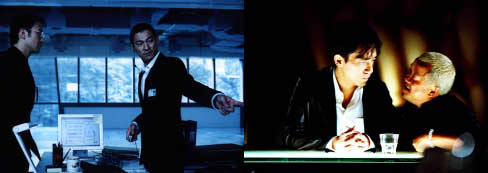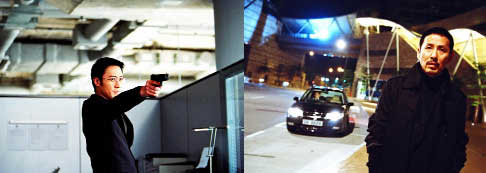Infernal Affairs III

Reviewed by YTSL
As those who know me are wont to observe, it’s
not that uncommon for me to feel compelled to watch a movie more than once.
Usually though, I reserve such treatment for efforts that I really liked the
first time around. In the case of the third and final part of the “Infernal
Affairs” trilogy, however, my strong urge to re-view the film as soon as
I exited the cinema in which it had screened came from that which was released
in Malaysian as well as Hong Kong multiplexes on December 12th, 2003 -- i.e.,
exactly one year after the original and widely agreed to be the best “Infernal
Affairs” effort -- having felt too (unnecessarily) confusing the first time
around.

On a single viewing, INFERNAL AFFAIRS III can come across as Andrew Lau and
Alan Mak’s attempt to emulate “Ashes of Time” (in much the same way as “Infernal
Affairs II” has been characterized as a “Godfather” wanna-be). As much
as I love that 1994 Wong Kar Wai work, this description is not meant to be
taken as unadulterated -- or even qualified -- praise. Instead, in
making this comparison, the main point that I wish to put across is that
this ambitiously conceived crime drama has got a deceptively difficult to
follow story; in large part because of the tale’s possessing a non-linear,
flashback strewn structure but also due to its additionally having a character
who looks to have developed mental problems, and become schizophrenic, as
a result of wanting so badly to be someone else (or, at the very least, to
inhabit a role accorded to another).

Those who have viewed “Infernal Affairs I” (and if you haven’t, I’d strongly
advise you to do so before viewing this follow up film) will know that Tony
Leung Chiu Wai’s Chan Wing-Yan character wished nothing more than to cease
masquerading as a Triad and get back to being a recognizably legit police
officer -- i.e., the type who wouldn’t have to sneak a salute from the shadows
when he wanted to show his respect for a superior, never mind feel a constant
obligation to hide even the most trivial facts about himself from others,
including the women he grew to have affections for. And if it was not
already apparent at the end of that movie, it will become obvious when viewing
INFERNAL AFFAIRS III that Andy Lau’s Lau Kin-Ming character didn’t just hunger
to be any police officer (rather than one of a conniving gangster boss’ Triad
moles inside of the police force). Instead, what he ended up wanting
to be, above all else, was the admirably dedicated plus sacrificing Chan
Wing-Yan; an individual who was his year’s leading police cadet at the time
that he was selected to leave the academy to go so deep undercover that he
was deemed to be at risk of losing his soul to the Triads (as well as his
life in the blink of an eye).

In a chapter of the HKIFF’s “Hong Kong Panorama 2002-2003”, Alan Mak (who
co-directed all three “Infernal Affairs” movie with Andrew Lau and co-scripted
them with Felix Chong) divulged that “the original script [of “Infernal Affairs
(I)”] focused on the character...played by Andy Lau. There were many
scenes of this character using every expedient to achieve what he wants”
(2003:70). With these remarks in mind, it might be said that INFERNAL
AFFAIRS III is the section of this filmic trilogy that’s closest to the scriptwriters’
original vision. This is because of it being so that, for all of its
having more big name actors in it than the first effort, it’s especially
evident upon a second viewing that the multi-part saga’s third plus closing
“chapter” is primarily concerned with the increasingly internally tortured
Lau Kin-Ming and his attempts to find a way out of his personal equivalent
of “the Buddhist Avici hell, or the deepest inferno where suffering is longest
and greatest” (See the HKIFF’s “Hong Kong Panorama 2002-2003”, 2003:66),
and everlasting.

Whither the rest of INFERNAL AFFAIRS III’s stars and the characters they
play in this movie then? If truth be told, they are just there to be
red herrings, comic relief and/or luminous support for the most part.
Because of who they are and what they’re capable of doing though, many of
them do manage to make an impression plus contribution to the production
(that additionally accorded significant roles to its art director (Bill Lui),
costume designer (The idiosyncratically named Silver Cheung) and composer
(The even more eccentrically monikered Comfort Chan) as well as cinematographers
(Andrew Lau and Ng Man Ching)). Indeed, Little Tony threatens to steal
the show -- from Andy Lau in particular -- once again. Also, one can
do so much worse than give the likes of Anthony Wong, Eric Tsang and Chapman
To one more chance to comfortably slip into their now familiar “Infernal
Affairs” roles.

Additionally, even while they did not get as much screen time as they deserved,
Leon Lai (who portrays Yeung Kam-Wing, a powerful Security Division Chief
Inspector for much of INFERNAL AFFAIRS III) and Chen Daoming (as a mysterious
Mainland Chinese man known to many as Shen) do manage to impress. Furthermore,
the inclusion of their characters successfully added extra layers and wrinkles
to the increasingly complex saga. Not so in the case of weak link Kelly
Chen’s Dr. Li, who’s yet another implausible acting psychologist/psychiatrist
to add to Hong Kong cinema’s growing list of such personnel. Moreover,
do not count on Carina Lau and Sammi Cheng -- prominently listed as guest
stars in both the opening and end credits -- to have much time and opportunity
to do more than make what really are mere throwaway plus needless cameo appearances
in an offering that -- to my mind, at least -- proved to be interesting,
thought-provoking and, ultimately plus generally, worthy.

My rating for the film: 7.5







